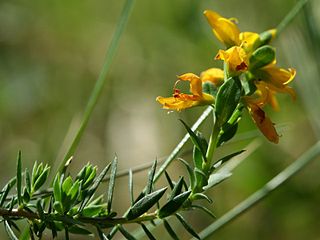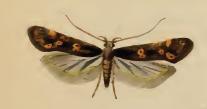
Genista is a genus of flowering plants in the legume family Fabaceae, native to open habitats such as moorland and pasture in Europe and western Asia. They include species commonly called broom, though the term may also refer to other genera, including Cytisus and Chamaecytisus. Brooms in other genera are sometimes considered synonymous with Genista: Echinospartum, Retama, Spartium, Stauracanthus, and Ulex.

The green hairstreak is a small butterfly in the family Lycaenidae.

Genista monspessulana, commonly known as French broom, Montpellier broom, or Cape broom (Australia), is a woody leguminous perennial shrub. The yellow-flowering bush is native to the Mediterranean region, and while it may still be commonly sold in some garden stores, it is considered an invasive plant in most places where it has been introduced. It is a noxious weed on the western coast of the US and in parts of Australia.

Genista tinctoria, the dyer's greenweed or dyer's broom, is a species of flowering plant in the family Fabaceae. Its other common names include dyer's whin, waxen woad and waxen wood. The Latin specific epithet tinctoria means "used as a dye".

Genista anglica, the petty whin, needle furze or needle whin, is a shrubby flowering plant of the family Fabaceae which can be found in Europe. In Great Britain, it is found in Cornwall, Wales and eastern Scotland. It is 1 metre high.

Genista canariensis is a species of flowering plant in the legume family Fabaceae, known by the common names Canary broom, Canary Islands broom or florist's genista. It is native to the Canary Islands, but it grows as an introduced species in mainland Europe, especially Spain, and on other continents. It has been introduced to California and Washington State in the US. This is a vigorous upright evergreen shrub growing to 3 m (9.8 ft) tall by 1.5 m (4.9 ft) broad, with hairy green stems. The leaves are made up of oval-shaped blue-green leaflets each up to a centimeter long and densely hairy on the undersides. The raceme inflorescence holds up to 20 bright yellow pea-like flowers. The fruit is a legume pod one to two centimeters long containing several dark brown seeds.

Genista Mary "Jenny" McIntosh, Baroness McIntosh of Hudnall, is a British arts consultant, theatre executive and Labour politician.

Genista pilosa, commonly known as hairy greenweed, silkyleaf broom, silkyleaf woadwaxen and creeping broom, is a plant species in the genus Genista. It is 30–45 centimetres (12–18 in) tall and has green coloured stems. It has yellowish coloured flowers which grow in 1-3 pairs. It grows in western and central Europe in poor, dry, sandy, and stony soils.

Genista germanica, the German greenweed, is a plant species in the genus Genista belonging to the family Fabaceae.
Trifurcula beirnei is a moth of the family Nepticulidae. It is found in Great Britain, Denmark and parts of Germany, Poland, Austria, the Czech Republic, Slovakia and Hungary. It is also found in the Volga and Ural region of Russia.

Phyllonorycter staintoniella is a moth of the family Gracillariidae. It is found from Sweden to the Pyrenees, Sardinia, Italy and Bulgaria and from Great Britain to Poland and Romania.

Agonopterix atomella is a moth of the family Depressariidae. It is found in most of Europe.

Mirificarma lentiginosella is a moth of the family Gelechiidae. It is found from most of Europe to the Ural Mountains and Turkey.
Mirificarma interrupta is a moth of the family Gelechiidae. It is found in Portugal, Spain, France, the Benelux, central Europe, Romania and North Africa.
The Genista Caves are a series of caves located under Windmill Hill in the British Overseas Territory of Gibraltar. Fossils of various mammals and human remains were discovered here in the mid-1860s. The name of the caves is a play on words based on Captain Frederick Brome's name, who discovered them.
Genista Battery is an artillery battery in the British Overseas Territory of Gibraltar.
Prolita solutella is a moth of the family Gelechiidae. It is widely distributed throughout Europe, east to the Ural mountains. It is also found in Turkey. The habitat consists of dry pastures and dry heathland.

Genisteae is a tribe of trees, shrubs and herbaceous plants in the subfamily Faboideae of the family Fabaceae. It includes a number of well-known plants including broom, lupine (lupin), gorse and laburnum.

Genista sagittalis, called the arrow-jointed broom and winged broom, is a species of flowering plant in the genus Genista, native to central and southern Europe, Ukraine, and Anatolia. Its subspecies Genista sagittalis subsp. delphinensis, called rock broom, has gained the Royal Horticultural Society's Award of Garden Merit.








